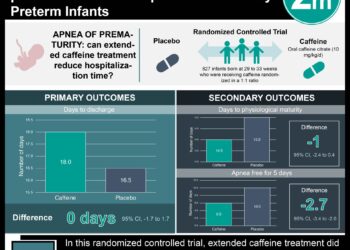Progesterone injections reduce recurrent preterm birth [Classics Series]
1. In women with a history of preterm birth, weekly progesterone injections reduced the risk of delivery prior to 37, 35, and 32 weeks gestation.
2. Number needed to treat to prevent one preterm birth <37 weeks was six women.
Original date of publication: June 2003
Study Rundown: Spontaneous preterm birth is a common, morbid syndrome that contributes to the relatively high infant mortality rate in the United States. Currently, preterm delivery complicates 11.2% of U.S. pregnancies. History of prior spontaneous preterm birth is the strongest predictor of preterm birth such that women with this history experience a 2.5 fold increased risk for recurrent preterm birth. Despite much study, the mechanisms contributing to the impairment of normal cervical physiology in pregnancy remain poorly characterized. Similarly, investigations of interventions to decrease risk of recurrent preterm birth (e.g. bedrest, tocolytics, antibiotics, etc) have failed to identify consistently effective preventive management. Small studies investigating the impact of a metabolite of progesterone, 17 alpha-hydroxyprogesterone caproate (17OHPc) on reduction of preterm delivery showed promise, although others identified no benefit. There is biologic plausibility for progesterone supplementation preventing onset or propagation of preterm parturition through prevention of gap junction formation in cervical stroma or antagonism of oxytocin.
Researchers evaluated the impact of weekly progesterone injections (from 16 through 36 weeks gestation) on the risk of preterm delivery prior to 37 weeks gestation among women with a history of prior preterm delivery. Strengths of the investigation include parsimonious double-blinded, placebo-controlled design and use of an inert injectable placebo. Most preterm deliveries occur in women with no history of preterm delivery such that the findings of this investigation will not affect primary prevention. Additional limitations included higher average number of preterm deliveries in the placebo group; accounting for this risk factor and potential confounder did not appreciably alter effect estimates. Future studies could evaluate this research question in other populations (e.g. women receiving cerclage, multiple gestations, or those with risk factors for preterm birth but no personal history) and might randomize by number of prior preterm births and BMI.
Click to read the study in NEJM
Background reading: The Preterm Prediction Study: Effect of gestational age and cause on subsequent obstetric outcome (Mercer, AJOG)
Dr. Alan Peaceman, MD, talks to 2 Minute Medicine: Northwestern University School of Medicine; Chief, Division of Obstetrics and Gynecology-Maternal Fetal Medicine.
“This landmark trial in women with prior spontaneous preterm birth demonstrated a reduced incidence of preterm delivery before 37 weeks among women randomized to receive progesterone injections. Treatment was also associated with a significant reduction in neonatal morbidities. These findings changed clinical practice such that it is now recommended that women with a history of prior preterm birth receive weekly progesterone injections from 16 through 36 weeks gestation.”
In-Depth [multi-center double-blind, placebo-controlled trial]: Women were enrolled at 19 different clinical centers and randomized in a 2:1 ratio to receive weekly injections of 250mg 17-OHPc (n=310) or inert oil placebo (n=153) from the time of enrollment through 36 weeks gestation. A 2:1 ratio was employed to minimize the number of women receiving weekly painful placebo injections of no direct benefit. Pregnant women with a history of prior preterm delivery between 20 weeks and 36 weeks 6 days, a current pregnancy between 15 and 20 weeks gestation and a documented ultrasound between 14 and 21 weeks gestation were eligible. Those with multifetal gestations, fetal anomalies, planned cerclage and other high-risk maternal fetal conditions that increase risk for preterm delivery not related to cervical insufficiency were excluded. Primary outcome was preterm delivery prior to 37 weeks gestation. Other outcomes assessed included birth weight and neonatal morbidities.
Women randomized to receive weekly progesterone injections experienced lower rates of preterm delivery before 37 weeks (36 vs. 55%, RR: 0.66, p=0.001), before 35 weeks (21 vs. 31%, RR:0.67, p=0.02) and before 32 weeks gestation (11 vs 20%, RR:0.58, p=0.02). Survival analysis demonstrated significant prolongation of pregnancy with use of progesterone compared to placebo (p=0.01) and number needed to treat to prevent one preterm birth before 37 weeks was six (CI: 3.6-11.1). Infants of women randomized to progesterone experienced lower rates of necrotizing enterocolitis, intraventricular hemorrhage, and need for supplemental oxygen.
More from this author: Risks of trial of labor after cesarean delivery (TOLAC) [Classics Series], Recurrent pregnancy loss associated with increased cardiovascular morbidity, Home self sonograms for assisted reproduction comparable to in-office imaging, Induction of labor more successful with standardization, The TRINOVA-1 trial: trebananib decreases progression of recurrent ovarian cancer
Image: PD
©2012-2014 2minutemedicine.com. All rights reserved. No works may be reproduced without expressed written consent from 2minutemedicine.com. Disclaimer: We present factual information directly from peer reviewed medical journals. No post should be construed as medical advice and is not intended as such by the authors, editors, staff or by 2minutemedicine.com. PLEASE SEE A HEALTHCARE PROVIDER IN YOUR AREA IF YOU SEEK MEDICAL ADVICE OF ANY SORT.







